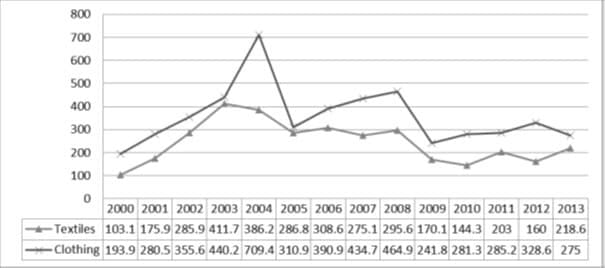TEXTILE Industry in Romania
Under communist rule, Romania had the biggest production capacity in the whole Eastern Bloc, after Russia. Romanian textile and garment industry has seen an overall decline since1989 mainly due to higher degree of competition from other countries such as Turkey, China, India, Pakistan, Thailand and Mexico. The high competition has forced the big Romanian companies to reorient their production towards disadvantaged economic regions due to net advantages from the point of view of legislative regulations, fiscal policy, environment protection regulations and the cost of labour.
Since 1989, the Romanian textile sector has also been changing due to the new economic, social and political conditions. There have been structural changes along with quantitative and qualitative changes as well. The share of garment sector in the industry rose from 28% in December 1989 to 62.5% in January 2004 and 44.7% in January 2015. Surprisingly, however, according to Euratex trade statistics, Romanian textile sector performed much better than the garment sector in 2018. Romanian textile exports rose 11.9% during the year, while imports were up 6.6%. But Romanian garment exports went down 4.5%, while imports soared 20.5%.
Between 2007-2017, 135,000 jobs were lost in the textile industry of Romania as a result of rising competition, both from within the EU region and from Asia. Other factors included financial crisis, and VAT hikes discouraging foreign investment. As of 2019, around 148,000 people were employed in Romania’s textile and garment industry.
Since 2007, when Romania joined European Union, clientele of Romania’s big textile companies such as Faberrom has changed in favour of top luxury brands. Today, less than 200 people sew garments in Faberrom for prominent western brands, and production has dropped from 7,000 to only 350 pieces per day.
The most important characteristic of garment industry in Romania has been the development of the Lohn production system, in which Romanian companies became subcontractors of foreign companies, without their own identity on the market (in terms of brand image, visual identity etc.). Because of the Lohn system, the local textile industry has had to suffer with the local demand becoming very low.
According to Figure 1 that shows investment in textiles and garment industry of Romania, there is a clear difference in the investment evolution between the two sectors. Thus, if in the start of the period, i.e. 2000, in the garment sector there were investments of about 90 million Lei higher than those in textiles, in 2003 the amounts invested for the two sectors were approximately the same. Amid the sharp rise of production in the Lohn system, in 2004 over 709 million Lei were invested in the garment firms, while the funds allocated to textile firms were lower by approximately 25 million than in 2003. Investments were made mainly in machinery and production equipment so that firms could accept external controls. This explains the decrease to less than half of this indicator in the next year as firms have already been re-technologized. Continuous fluctuations followed, without a predetermined pattern that can reveal a dependency or similarity between the two sectors. In 2013, it can be noted an improvement of this indicator compared to data from 2000. Investments in textiles doubled, reaching 218.6 million Lei in 2013, while in the garments industry investments were only of 275 million Lei.

Figure 1. The Evolution of Net Investments (mil. Lei – 4.8 Lei is roughly equivalent to 1 Euro)
Romanian textile and clothing industry has a long tradition of production and supply to foreign markets, due to its proximity major Western importers. An advantage for potential investors is that there are prerequisites for genuine competition for companies in the market.
Some important facts about textile and garment industry of Romania:
(i) Total imports of textile and garment by Romania from other countries: Euro 1.49 billion (2018).
(ii) Total exports of textile and garment by Romania to other countries: Euro 0.81 billion (2018).
(iii) Major items of import: Synthetic fibers, cotton and cotton yarns, cotton and cotton fabrics, wool and wool type fabrics, silk fabrics, knitwear, socks and stockings (2018).
(iv) Major items of export: Knitwear, synthetic fibers, wool yarn and wool type, synthetic yarn fabrics,
(v) Top countries from where textile and garment is imported by Romania: Italy, Poland, UK, Germany, Spain.
(vi) Top countries to which Romania exports textile and garment: Italy, France, Germany, Austria, Macedonia, Moldova.
List of major textile and garment companies of Romania along with contact details:
TANEX SRL
Sos. Bucuresti – Magurele, nr. 47B, Sector: 5, 051432, Bucuresti, Romania
Tel: 0040-21-421-0216
Email: office@tanex.ro
Website: www.tanex.ro
Nova Textile SRL
Str. George Cosbuc, nr. 70, 110103, Pitesti, Jud. Arges, Romania
Tel: 0040-248-282-883
Email: office@nova-textile.ro
Website: www.nova-textile.ro
TRICOTEX Bacău
Str. Tineretului , nr. 2, Bacau, Romania
Tel: 0040-234-515-220
Email: office@tricotexbacau.ro
Website: www.tricotexbacau.ro
Ann Reeves & Francesca
Str. Nicolae Balcescu, nr.173, Piteşti, Argeş 110066, Romania.
Tel: 0040-248-280-535
Email: office@francesca.ro
Website: www.francesca.ro
VASTEX S.A.
Strada Stefan cel Mare, nr. 273, 730006, Vaslui, Romania.
Tel: 0040-235-361-536
Email: office@vastexvs.ro
Website: www.vastexvs.ro
MAJUTEX S.R.L.
Str. Dafina Doamna nr. 46, Bârnova 707035, Romania
Tel: 0040-723-553-707
Email: office@majutex.ro
Website: www.majutex.ro
Details of industrial parks and regions of Romania
Sabaru Industrial Park
Alexandriei Venue nr. 544, km.14, 07025 Bagadiru, Ilfov, Romania
Tel: 0040-021-4481-498/ 0040-21-4481-499
Mobile: 0040-749-550-143/ 0040-749-550-140
Email: office@sabaru.ro
Website: www.sabaru.ro
Adlo Oradea (Oradea local development agency)
Str. Primăriei nr 3, parter, Oradea, Bihor
Tel: 0040-359-889-389
E-mail: contact@adlo.ro
Website: www.adlo.ro
Cisnadie Industrial and Business Park I Sibiu I Romania
Transilvaniei, nr. 5 si 11 Cisnadie, Romania
Phone: 0040-721-264-044
Email: office@spatiidepozit.ro
Website: www.spatiidepozit.ro
Moreni Industrial Park
TELEFON: 0245 668490;
FAX: 0245 668490;
Director General : 0723 661064
parci_moreni2002@yahoo.com
TELEFON: 0245 668490;
FAX: 0245 668490;
Director General : 0723 661064
parci_moreni2002@yahoo.com
TELEFON: 0245 668490;
FAX: 0245 668490;
Director General : 0723 661064
parci_moreni2002@yahoo.com
Teis street, nr. 16 D, Moreni, Dambovita County, 135300, Romania
Tel: 0040-245-668-490
Email: parc_moreni2002@yahoo.com
Website: www.parcindustrialmoreni.r
Miroslava Industrial Park
Miroslava, Iasi County, Romania
Tel: 0040-232-295-680, 0040-748-663-344
Email: office@miroslavaindustrial.ro
Website: www.miroslavaindustrial.ro
Details of textile and garment associations, investment promotion agencies, key Ministries etc.
Ministry of Economy, Energy and Business Environment
Government of Romania
Victoriei Avenue, nr. 152, Sector 1, Bucureşti, cod 010096
Tel: 0040-21-202-5106/ 0040-21-202-5311
Textile Industry National Association of Romania
Tel: 0040-749-126-111
Email: contact@asociatiatextilistilor.ro
Website: www.asociatiatextilistilor.ro
Patronage Federation of Textile, Clothing and Leather
George Enescu street, nr.27-29, UGIR-1903 Palace, 010303, Sector 1, Bucuresti,
Tel: 0040-21-3112-981, 0040-21-3112-982
Email: office@fepaius.ro, fepaius@fepaius.ro
Website: www.fepaius.ro

